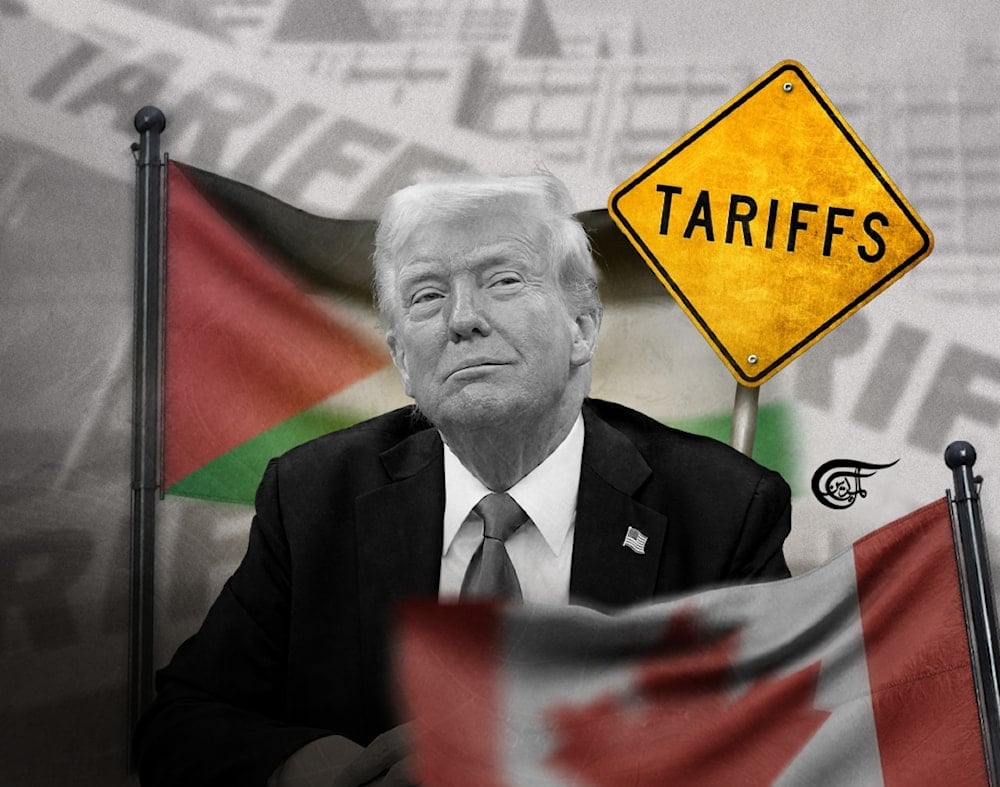News from Nowhere: O My America!
Trump is, in short, a glorified mafia boss who expects homage and obedience from the nations of the world – or at least all those nations that aren't strong enough to resist his threats.
-

Trump’s tantrum over Canada’s recognition of Palestine isn’t just politics, it’s a power play (Illustrated by Zeinab al-Hajj for Al Mayadeen English)
When Canada announced that it planned to follow France in formally recognising a Palestinian state next month, Donald Trump responded that this decision "will make it very hard for us to make a Trade Deal with them."
"Oh Canada!!!" – he added, with a characteristically hyperbolic excess of punctuation. (There was also an enigmatically unnecessary apostrophe in there, which I've chosen to omit in the hope of achieving some vague sense of coherence.)
Oh my, America.
It was early in the morning on the last day of July, the final day of negotiations for countries that had failed by that point to strike trade deals with Trump’s administration. Canada's failure to strike such a deal would result in the imposition of a 35% tariff on most of the goods it exports to the United States.
Trump's last-minute intervention may have been intended to strengthen his hand – and to justify a hardening of his position – in those negotiations. But his willingness to openly connect foreign policy goals with trade strategies reveals rather more about the Day-Glo president's approach to the duties of his office and ways of doing business with the world than he might like to admit.
The first thing we notice is that, of course, he chose to make his veiled threat on his own social media platform rather than through the official channels of the presidency.
There's nothing new there, and Mr. Trump clearly does this for two reasons: to promote the usage and therefore the market value of his Truth Social platform; and to ensure that he and his heirs grow such a powerful channel of communication and influence which they can retain after his time in the White House – unlike, say, the POTUS account on X, which presidents must relinquish when they leave power. (For the same reason, he'd continued to use and promote his personal account on Twitter, rather than use the official POTUS one, during his first term in office.)
We might contrast this to the protocols for government announcements in the UK, where the Prime Minister has recently been criticized for daring to call official press conferences to break the news of policy decisions rather than having such announcements be first delivered directly to the floor of the House of Commons.
Indeed, Trump’s capacity and brazen eagerness to use his position to promote his own business interests was further underlined towards the end of last month when he combined a trip to open his new golf course in Scotland with a meeting with UK premier Keir Starmer, even flying Sir Keir twice around the course in a shameless exploitation of his office to push his commercial concerns.
That brings us to the second thing we might observe about Trump's response to Canada's decision to recognise Palestine: its typical inconsistency in relation to his other responses.
Shortly after his meeting with the American president in Scotland, Keir Starmer announced that the UK would move to recognise Palestine unless a swift end is brought to the war in Gaza. This move prompted no verbal retaliation from Trump. In fact, one suspects that the British Prime Minister might have discussed his position with the president in advance of his announcement.
Nor did France’s decision to recognise Palestine scupper the trade deal confirmed at the end of July between the United States and the European Union, poor though that agreement was for the EU.
It seems clear that Mr. Trump’s public wrath, like that of any bully, tends to be directed at those he perceives to be in positions of relative weakness, and those who fail to perform fawning acts of tribute to his eternal orange glory.
The third – and perhaps rather more troubling – point revealed by Trump's response to the Canadian decision is that he is explicitly using trade policy in a bid to gain broader geopolitical control. He is happy to deploy tariffs to punish any country that dares disobey his will – any territory that fails to submit to his fiefdom.
He is, in short, a glorified mafia boss who expects homage and obedience from the nations of the world – or at least all those nations that aren't strong enough to resist his threats.
They have to sit there and take his insults – like the English-speaking Liberian leader whose command of the language the incoherent president last month patronisingly praised – and capitulate to his power in front of the world’s TV cameras.
Whatever one’s geopolitical views, it seems obvious that the American president’s bullying sets a dangerous global precedent.
His message is clear: those leaders – such as Canada's Mark Carney – who stand up for their nation's dignity and interests, or for the world’s interests, will be in for a hard time from this uniquely volatile and capricious president, this individual whose presence in the Oval Office – whose unsafe one-man kingdom – makes our planet a much more precarious place.

 Alex Roberts
Alex Roberts
 5 Min Read
5 Min Read











